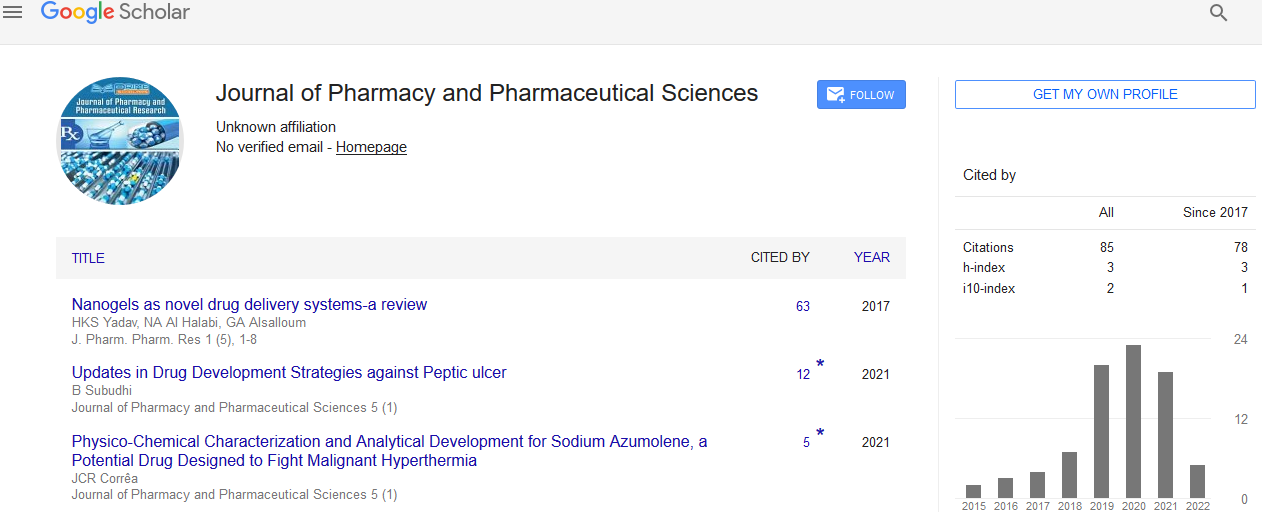Commentary - (2023) Volume 7, Issue 3
Multitarget Drug Discovery: A New Paradigm in Pharmaceutical Research
Metin Lyar*
Department of Pharmacy, University of Perth, Australia
*Correspondence:
Metin Lyar,
Department of Pharmacy, University of Perth,
Australia,
Email:
Received: 29-Aug-2023, Manuscript No. IPIPR-23-18162;
Editor assigned: 31-Aug-2023, Pre QC No. IPIPR-23-18162 (PQ);
Reviewed: 14-Sep-2023, QC No. IPIPR-23-18162;
Revised: 19-Sep-2023, Manuscript No. IPIPR-23-18162 (R);
Published:
26-Sep-2023, DOI: 10.21767/ipipr.7.03.022
Description
In the world of drug discovery and development, the quest for
innovative and effective therapies is a never-ending journey. One
approach that has gained considerable attention in recent years
is multitarget drug discovery, a paradigm shift in which researchers
aim to design pharmaceuticals that interact with multiple biological
targets. This article explores the concept of multitarget
drug discovery, its significance, the challenges it presents, and its
potential to transform the future of medicine. Traditionally, drug
development has focused on designing compounds that target
a single protein or pathway associated with a particular disease.
However, many complex diseases, such as cancer, Alzheimer’s,
and cardiovascular disorders, often involve multiple molecular
pathways or mechanisms. In such cases, single-target drugs may
not be sufficient to provide effective treatment. Multitarget drug
discovery addresses this limitation by designing compounds that
simultaneously interact with multiple targets.
By targeting multiple disease-related pathways, multitarget drugs
have the potential to provide more comprehensive and effective
treatment. Targeting multiple pathways can reduce the likelihood
of drug resistance, a common issue in single-target drug therapies.
Multitarget drugs can often be designed at lower individual
doses, minimizing adverse effects on non-target proteins. Repurposing
existing drugs for new indications is more feasible when
the compounds have multiple targets, increasing their therapeutic
utility. Designing compounds that interact with multiple targets
is significantly more complex than traditional single-target drugs.
The broad interaction profile of multitarget drugs may lead to unintended
effects on non-disease-related proteins.
Balancing the pharmacokinetics of multitarget drugs, such as absorption,
distribution, metabolism, and excretion, can be challenging.
Regulatory agencies often require a deeper understanding
of the mechanisms of action and potential risks associated with
multitarget drugs. Multitarget drug discovery is poised to play a
pivotal role in shaping the future of medicine. As our understanding
of complex diseases deepens and the tools for computational
drug design advance, researchers will have a broader range of
therapeutic options at their disposal. The integration of artificial
intelligence and machine learning will aid in identifying potential
multitarget compounds with high specificity, efficacy, and safety.
Moreover, personalized medicine is expected to benefit greatly
from multitarget drug development, as it allows for tailored treatment
approaches that address the unique molecular profiles of
individual patients.
In conclusion, multitarget drug discovery represents a paradigm
shift in pharmaceutical research, offering innovative solutions for
complex diseases that elude traditional single-target therapies.
While there are challenges to overcome, the potential benefits
in terms of efficacy and safety make this approach a promising
avenue for the development of more effective and personalized
treatments. As technology and knowledge continue to advance,
the future of medicine may well be defined by multitarget drug
discovery. By embracing the challenges and harnessing the power
of network pharmacology and advanced computational tools,
researchers are poised to unlock a new era of precision medicine,
where personalized therapies tailored to individual molecular profiles
become the cornerstone of patient care. As our understanding
of disease mechanisms continues to evolve, multitarget drug
discovery stands as a beacon of hope in the pursuit of more effective,
safer, and personalized treatments for a multitude of complex
diseases.
Acknowledgement
The author is grateful to the journal editor and the anonymous
reviewers for their helpful comments and suggestions.
Conflict Of Interest
The author declared no potential conflicts of interest for the research,
authorship, and/or publication of this article.
Citation: Lyar M (2023) Multitarget Drug Discovery: A New Paradigm in Pharmaceutical Research. J Pharm Pharm Res. 7:022.
Copyright: © 2023 Lyar M. This is an open-access article distributed under the terms of the Creative Commons Attribution License, which permits unrestricted use, distribution, and reproduction in any medium, provided the original author and source are credited.

